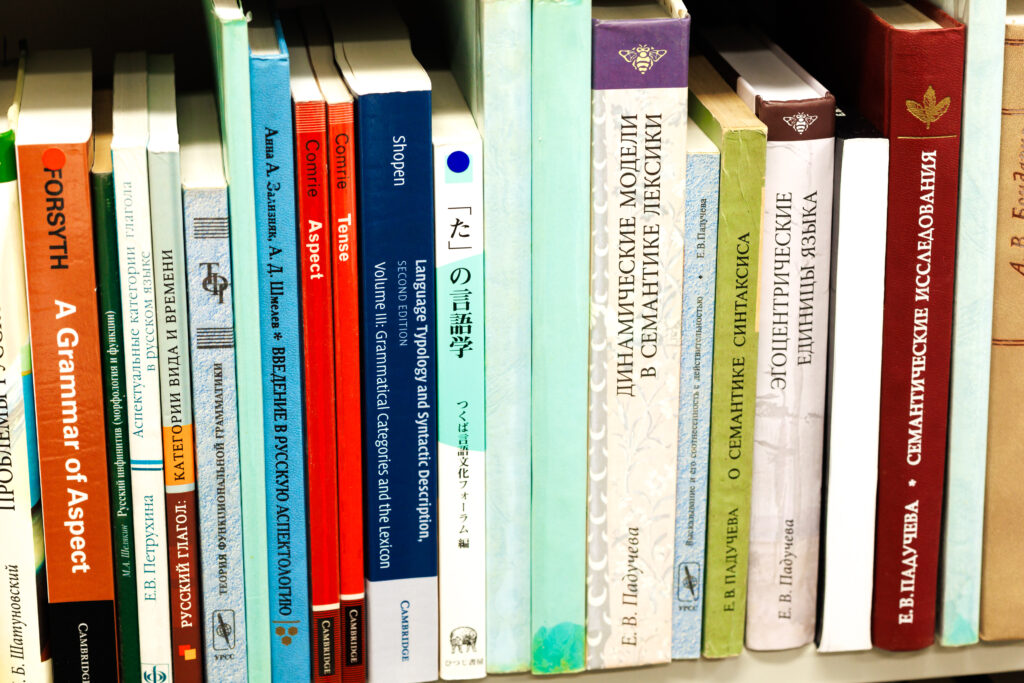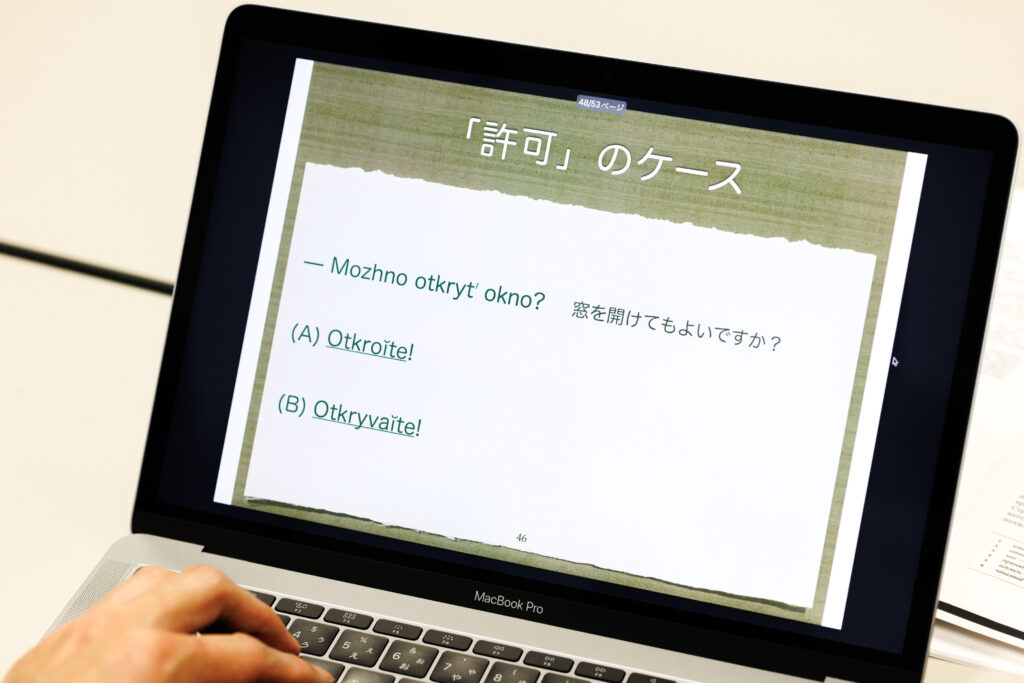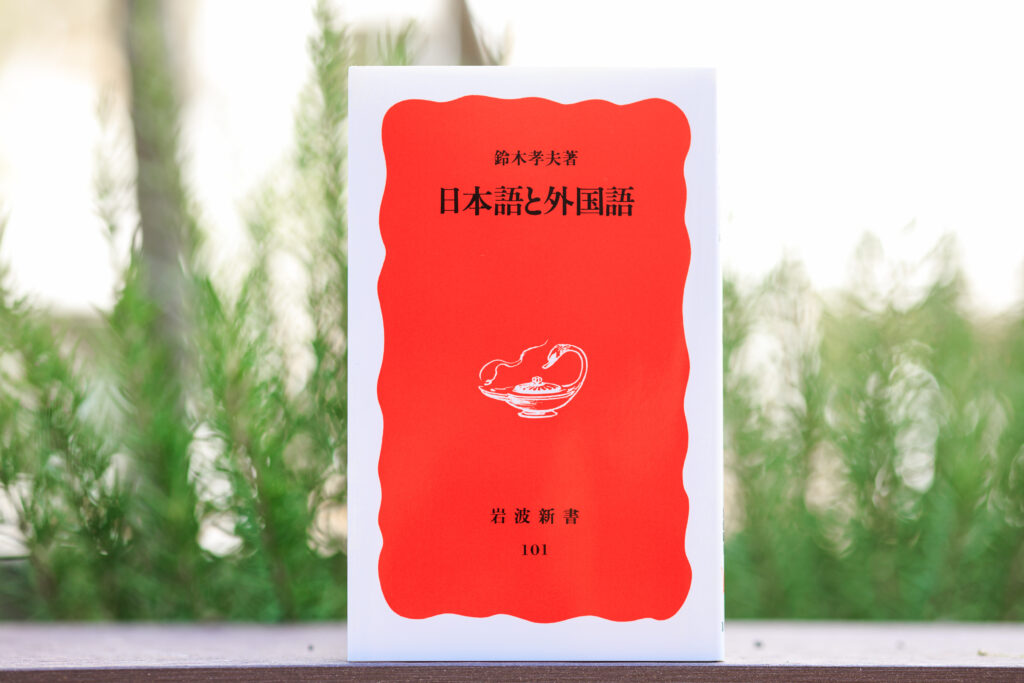
The Russian language has its own alphabet, and a word with a single meaning morphs into innumerable different forms. But understanding how to use Russian verbs is particularly perplexing. Associate Professor Nobuyoshi Adegawa of the Faculty of Foreign Studies discusses what makes Russian linguistically unique, and what makes studying the language so important.
I specialize in linguistics, and my research is focused on the meaning and usage of Russian verbs. In particular, I am interested in grammatical “aspects,” which are used to determine whether a verb is perfective or imperfective.
English expresses the progressive aspect by suffixing an “-ing” to the end of the verb, or perfective aspect by using the past participle form. In Japanese, we use auxiliary particles to express the progressive or perfective meaning.
In Russian, however, the perfect or imperfect are not expressed by simply adding a suffix to the verb—the expressions require two entirely different verbs. In other words, Russian has two forms—more formally known as “aspects”—for each verb, which are called the “perfective aspect” and the “imperfective aspect.”
The speaker must choose which aspect to use when forming a sentence. But this choice depends not only on what the speaker wishes to express, but also on the words that come before and after the verb. This makes choosing the correct aspect extremely complex—and my research is centered on building a theory that clarifies which aspect to use in which scenario.
Analyzing grammatical patterns in thousands of sentences

One of my research methods is to gather thousands of Russian sentences, and to determine when the perfective aspect and when the imperfective aspect is used. The task is demanding, with much of it done by hand, but it does reveal trends governing when each aspect is used.
Another method is to enlist the help of native Russian speakers to confirm the meaning and nuances conveyed by each aspect in different scenarios, and record how they are used. In fact, it is by no means rare for everyday Russian expressions to be poorly understood from a theoretical point of view.
Let me give you an example. In Japanese, we might use the tag question “This room is cold, isn’t it?” as a way of asking the listener to turn the heating on. But in Russian, the use of the perfective or imperfective aspect when making a request might impart different nuances. It is one of my goals to investigate these nuances, and build a theory governing their use.
Languages can shape our perspectives
For people learning Russian as a foreign language, choosing which verb aspect to use can be challenging. Interestingly, however, only a small number of Russian language researchers in Japan specialize in the use of aspects.
If we can come up with a simple explanation for which aspect should be used in which scenario, it should make learning Russian easier. Of course, while investigating linguistic properties and building linguistic theories are interesting in their own right, I believe it is vitally important that we feed the results of our research back into education.
I am not a native Russian speaker—but it is precisely for this reason that I am able to recognize the difficulty of its grammar. Those of us who are native Japanese speakers naturally differentiate between the use of the particles “wa” and “ga.”
But for someone who has learned Japanese as a foreign language, it can be difficult to understand the difference between the two, even in simple sentences. It would help these learners immeasurably if we could explain the differences in a rational manner—and I believe the same can be said of Russian verb aspects.
As a linguist, I have come to recognize that languages can shape how we see things, how we understand things, and how we feel about things. My research into verbs has shown me that there are both differences and similarities between how Russian verbs are used and understood, and how Japanese verbs are used and understood.
It may be that such points of difference and similarity only become clear when comparing one language with another. Learning a language leads to a deeper understanding of how humans see and feel. As the study of language, linguistics requires us to continually accept and respect each other’s differences.
The book I recommend
“Nihongo to gaikokugo”(Japanese and foreign languages)
by Takao Suzuki, Iwanami Shoten

This book taught me that the prism of a foreign language can radically change how we see the world. It uses real-life examples—the distinction between a butterfly and a moth, for example, or how we express colors—to illuminate how different languages understand different phenomena. I can recommend this book to anyone with an interest in foreign languages.
-
Nobuyoshi Adegawa
- Associate Professor
Department of Russian Studies
Faculty of Foreign Studies
- Associate Professor
-
Associate Professor Nobuyoshi Adegawa graduated from the Course in Russian and East European (major in Russian), Faculty of Foreign Studies, Tokyo University of Foreign Studies, and received his Ph.D. from the university’s Graduate School of Area and Culture Studies. After working as a part-time lecturer at the Tokyo University of Foreign Studies, Kanagawa University, and other educational institutes, Adegawa was appointed assistant professor at the Faculty of Foreign Studies, Sophia University, before assuming his current position in fiscal 2023.
- Department of Russian Studies
Interviewed: July 2023